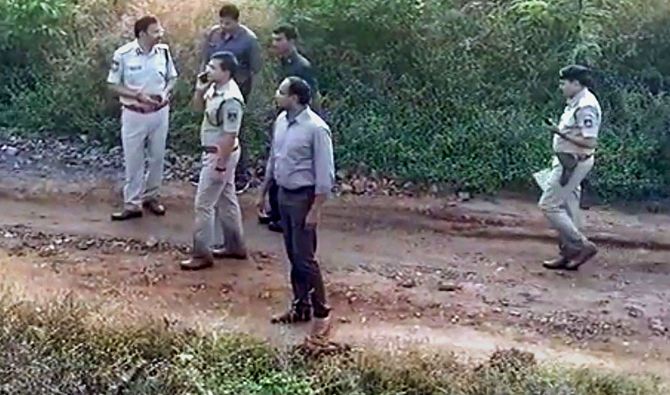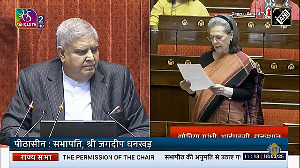'Let us not fool ourselves into thinking that by sidestepping the rule of law, justice has been served in this case because we have once again very conveniently and completely absolved society's responsibility in all of this,' says Neetika Vishwanath.

The brutal gang-rape and murder of a doctor in Hyderabad by four men unknown to her has once again brought back the conversation on death penalty for sexual violence into the public realm.
The case has resulted in a collective public clamour to hang the rapists.
Public demand for the death sentence in response to sexual violence is not new and has previously been made in the Kathua and Unnao case in 2018 and when Jyoti Singh was gang-raped and murdered in Delhi in 2012.
Nation-wide protests around these cases have eventually resulted in harsher criminal laws relating to violence against women and in introduction of the death sentence as a possible punishment for sexual abuse against children and for repeat sexual offences.
It is the understanding that given the horrific nature of the crime, the death sentence would be the only justified punishment for the accused persons in this case.
The death penalty is also seen as an effective deterrent that will potentially reduce sexual violence against women by inducing the fear of death in future potential offenders.
In relying on the death sentence to address sexual violence against women, we are expecting something from criminal law that it is perhaps incapable of doing.
Harsher criminal laws cannot eliminate sexual violence and transform societies; especially a society which is so deeply embedded in a rape culture. Criminal law can only play a limited role in the context of sexual violence.
There is sufficient empirical evidence to suggest that it is the probability of punishment rather than the severity of it that deters potential offenders.
In responding to heinous crimes with harsher punishments as the solution, we lose sight of the context in which punishment operates, which is the Indian criminal justice system. The question of punishment becomes relevant only once the accused has been held guilty.
By completely ignoring the systemic realities including police apathy towards rape survivors, poor investigation and a judgmental criminal justice system and only asking for harsher punishments as a solution, our outrage as a society seems rather shallow. It starts appearing for what it really is -- shying away from the responsibility as a society for sexual violence against women.
It is also quite paradoxical that a society which in many ways actively promotes the rape culture through cultural practices and societal attitudes suddenly decides to act out when heinous sexual crimes against women are committed.
The triviliasation and normalisation of sexual violence in the popular and media culture which takes forms of objectification of women's bodies, sexually explicit jokes, victim shaming etc, contributes to creating an environment that disregards women's bodily integrity and perpetuates sexual violence.
I, therefore, find it very convenient and cowardly as a society to place the blame and direct our vengeance on few individuals without any reflection on society's role in sustaining such crimes.
It is time that we as a society share collective responsibility for sexual violence against women rather than solely putting the blame on few individuals. By demonising the accused persons in cases involving brutal violent rape and treating them as exceptions, we deny the pervasive nature of sexual violence against women in India.
Perpetrators of sexual violence are not fringe elements, but very much members of society.
Our selective outrage as a society only in rape cases that involve extreme brutality and murder refutes the broad pervasive spectrum of crimes against women.
Data from the National Crime Records Bureau shows that most (93.1%) sexual violence against women and children in India involves known persons as perpetrators. Rape by strangers form a very small percentage of these cases.
It is men who very much form part of our society both in the private and public realm who commit rape on women.
As a society, we need to accept and internalise the prevalent nature of sexual violence both within and outside our homes. It is only with this acknowledgement that we can break out of the post incident vengeance mode which is centered on getting rid of the individual(s) without even beginning to confront the problem.
Removing the perpetrator(s) from society allows us to conveniently avoid the much needed exercise of reflection as a society.
Societal rage is rather unproductive if it doesn't force us to think beyond individual incidents and confront the troubling roots of sexual violence that are deeply embedded in our society.
Our collective anger and frustration as a society about sexual violence needs to be channeled into dismantling patriarchal, casteist, ableist, ageist and classist attitudes that propagate the rape culture.
Having said this, as I write this column, I hear that the four accused persons in this case were shot dead in a police encounter on Thursday night in circumstances that I find quite suspicious. As per the reports, the accused were taken to the place of incident for re-creation of the crime where they tried to escape resulting in an encounter.
Let us not fool ourselves into thinking that by sidestepping the rule of law, justice has been served in this case because we have once again very conveniently and completely absolved society's responsibility in all of this.
Neetika Vishwanath is a lawyer and a legal researcher based in New Delhi. She currently works with Project 39A at the National Law University, Delhi. Her work focuses on research on sexual violence and sentencing.
The views expressed in this column are personal. She can be contacted at news@rediff.co.in.






 © 2025
© 2025